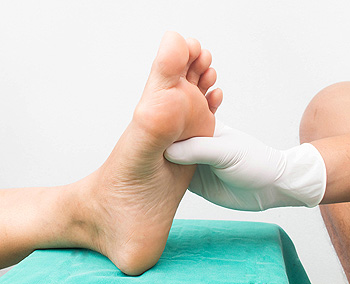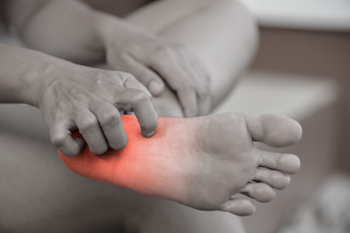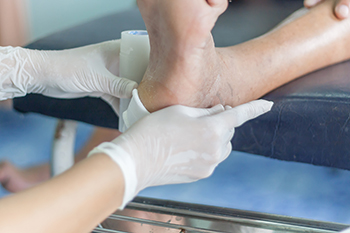Connect With Us
Blog
Items filtered by date: August 2023
Nurturing the Feet Is Essential for Diabetic Patients

For individuals living with diabetes, maintaining foot care takes on paramount importance. Elevated blood sugar levels can lead to nerve damage and reduced blood flow in the feet, making them vulnerable to infections and slow healing. Regularly inspecting the feet for any cuts, blisters, or sores, can help to prevent infections. It is helpful to moisturize the feet but avoid applying lotion between the toes. Wearing well-fitting shoes made from breathable materials may help to ensure maximum comfort. It is beneficial to choose seamless socks that can prevent friction. Trimming the nails straight across can help to avoid ingrown nails, and elevating the feet while sitting may promote healthy circulation. Prioritizing your foot health is crucial to having a comfortable and active life with diabetes. If you have diabetes, it is strongly suggested that you are under the care of a podiatrist who can help you to manage this serious condition.
Diabetic foot care is important in preventing foot ailments such as ulcers. If you are suffering from diabetes or have any other concerns about your feet, contact Emil Babayev, DPM from New York. Our doctor can provide the care you need to keep you pain-free and on your feet.
Diabetic Foot Care
Diabetes affects millions of people every year. The condition can damage blood vessels in many parts of the body, especially the feet. Because of this, taking care of your feet is essential if you have diabetes, and having a podiatrist help monitor your foot health is highly recommended.
The Importance of Caring for Your Feet
- Routinely inspect your feet for bruises or sores.
- Wear socks that fit your feet comfortably.
- Wear comfortable shoes that provide adequate support.
Patients with diabetes should have their doctor monitor their blood levels, as blood sugar levels play such a huge role in diabetic care. Monitoring these levels on a regular basis is highly advised.
It is always best to inform your healthcare professional of any concerns you may have regarding your feet, especially for diabetic patients. Early treatment and routine foot examinations are keys to maintaining proper health, especially because severe complications can arise if proper treatment is not applied.
If you have any questions please feel free to contact our offices located in Midwood and Kensington in Brooklyn, NY . We offer the newest diagnostic and treatment technologies for all your foot and ankle needs.
Symptoms, Causes, and Care of Foot Neuropathy

Foot neuropathy involves the nerves in the feet that are not working correctly. This can lead to various issues, such as numbness or tingling sensations in the feet, pain or sensitivity when the feet are touched, and muscle weakness, which can affect stability and balance. Additionally, changes in the appearance of the toenails and skin might occur. Without treatment, neuropathy can even lead to sores or cuts on the feet that do not heal properly and infections may develop. The causes of foot neuropathy are diverse. One of the major factors is diabetes, which can damage the nerves over time. If diabetes is involved, it is especially important to keep blood sugar under control, as this can help reduce symptoms. Foot strengthening exercises can help enhance muscle function and stability. To ensure the safety of the feet, it is essential to inspect them regularly. If you experience unusual sensations or notice changes in your feet, it is suggested that you make an appointment with a podiatrist as soon as possible.
Neuropathy
Neuropathy can be a potentially serious condition, especially if it is left undiagnosed. If you have any concerns that you may be experiencing nerve loss in your feet, consult with Emil Babayev, DPM from New York. Our doctor will assess your condition and provide you with quality foot and ankle treatment for neuropathy.
What Is Neuropathy?
Neuropathy is a condition that leads to damage to the nerves in the body. Peripheral neuropathy, or neuropathy that affects your peripheral nervous system, usually occurs in the feet. Neuropathy can be triggered by a number of different causes. Such causes include diabetes, infections, cancers, disorders, and toxic substances.
Symptoms of Neuropathy Include:
- Numbness
- Sensation loss
- Prickling and tingling sensations
- Throbbing, freezing, burning pains
- Muscle weakness
Those with diabetes are at serious risk due to being unable to feel an ulcer on their feet. Diabetics usually also suffer from poor blood circulation. This can lead to the wound not healing, infections occurring, and the limb may have to be amputated.
Treatment
To treat neuropathy in the foot, podiatrists will first diagnose the cause of the neuropathy. Figuring out the underlying cause of the neuropathy will allow the podiatrist to prescribe the best treatment, whether it be caused by diabetes, toxic substance exposure, infection, etc. If the nerve has not died, then it’s possible that sensation may be able to return to the foot.
Pain medication may be issued for pain. Electrical nerve stimulation can be used to stimulate nerves. If the neuropathy is caused from pressure on the nerves, then surgery may be necessary.
If you have any questions, please feel free to contact our offices located in Midwood and Kensington in Brooklyn, NY . We offer the newest diagnostic and treatment technologies for all your foot care needs.
Gout Pain Can Be Managed
Causes and Treatment of Heel Pain

Heel pain can be a frustrating and debilitating condition that affects individuals of all ages and activity levels. There are several potential causes of heel pain, with plantar fasciitis being the most common culprit. This condition arises due to inflammation of the plantar fascia, a thick band of tissue that supports the arch of the foot. Other causes of heel pain may include Achilles tendinitis, heel spurs, bursitis, or stress fractures. Effective treatment for heel pain depends on the underlying cause. Getting adequate rest and taking over-the-counter pain medications may offer temporary relief. However, addressing the root cause is crucial for long-term improvement. Performing stretching exercises, wearing orthotic inserts and supportive footwear are often recommended to alleviate symptoms and promote healing. Seeking professional medical advice is essential to accurately diagnose the cause of heel pain, which can determine what the most appropriate treatment plan is for a swift recovery. If you have heel pain, it is strongly suggested that you are under the care of a podiatrist who can help you manage this condition.
Many people suffer from bouts of heel pain. For more information, contact Emil Babayev, DPM of New York. Our doctor can provide the care you need to keep you pain-free and on your feet.
Causes of Heel Pain
Heel pain is often associated with plantar fasciitis. The plantar fascia is a band of tissues that extends along the bottom of the foot. A rip or tear in this ligament can cause inflammation of the tissue.
Achilles tendonitis is another cause of heel pain. Inflammation of the Achilles tendon will cause pain from fractures and muscle tearing. Lack of flexibility is also another symptom.
Heel spurs are another cause of pain. When the tissues of the plantar fascia undergo a great deal of stress, it can lead to ligament separation from the heel bone, causing heel spurs.
Why Might Heel Pain Occur?
- Wearing ill-fitting shoes
- Wearing non-supportive shoes
- Weight change
- Excessive running
Treatments
Heel pain should be treated as soon as possible for immediate results. Keeping your feet in a stress-free environment will help. If you suffer from Achilles tendonitis or plantar fasciitis, applying ice will reduce the swelling. Stretching before an exercise like running will help the muscles. Using all these tips will help make heel pain a condition of the past.
If you have any questions please contact our offices located in Midwood and Kensington in Brooklyn, NY . We offer the newest diagnostic and treatment technologies for all your foot and ankle needs.
When to See a Podiatrist for Wound Care

As the summer months begin, the risks of cutting or otherwise wounding your feet may increase. Wearing sandals or flip flops, as well as going barefoot more often can increase the chances of having to deal with foot wounds. If you are bleeding profusely from a wound, immediate medical attention is vital. There also may be times when a podiatrist is needed to attend to foot wounds, including punctures, lacerations, toenail injuries, and broken toes. When you step on a nail or other sharp object, the puncture wound may appear small and may not bleed very much. But because the depth of the wound can be a source of infection as well as damage to nerves and tendons, attention from this foot doctor is suggested. Abrasions or scrapes may bleed and ooze fluids, making it difficult to clear it from debris. To avoid infection setting in, it is suggested that you make an appointment with a podiatrist. Similarly, if you have a skin injury and have diabetes or vascular disease, seeing a podiatrist as soon as possible is strongly suggested.
Wound care is an important part in dealing with diabetes. If you have diabetes and a foot wound or would like more information about wound care for diabetics, consult with Emil Babayev, DPM from New York. Our doctor will assess your condition and provide you with quality foot and ankle treatment.
What Is Wound Care?
Wound care is the practice of taking proper care of a wound. This can range from the smallest to the largest of wounds. While everyone can benefit from proper wound care, it is much more important for diabetics. Diabetics often suffer from poor blood circulation which causes wounds to heal much slower than they would in a non-diabetic.
What Is the Importance of Wound Care?
While it may not seem apparent with small ulcers on the foot, for diabetics, any size ulcer can become infected. Diabetics often also suffer from neuropathy, or nerve loss. This means they might not even feel when they have an ulcer on their foot. If the wound becomes severely infected, amputation may be necessary. Therefore, it is of the upmost importance to properly care for any and all foot wounds.
How to Care for Wounds
The best way to care for foot wounds is to prevent them. For diabetics, this means daily inspections of the feet for any signs of abnormalities or ulcers. It is also recommended to see a podiatrist several times a year for a foot inspection. If you do have an ulcer, run the wound under water to clear dirt from the wound; then apply antibiotic ointment to the wound and cover with a bandage. Bandages should be changed daily and keeping pressure off the wound is smart. It is advised to see a podiatrist, who can keep an eye on it.
If you have any questions, please feel free to contact our offices located in Midwood and Kensington in Brooklyn, NY . We offer the newest diagnostic and treatment technologies for all your foot care needs.
What Are the Education Requirements to Become a Podiatrist?

A podiatrist is a physician who treats disorders of the feet and ankles. These can include ailments such as tumors, fractures, and abnormal foot structures. This branch of medicine requires an extensive education, and qualified candidates will have the letters DPM, Doctor of Podiatric Medicine, appear after their name once completed. The training begins with obtaining a bachelor's degree, followed by enrolling in a podiatric school for four years. A residency program that takes three years to finish will begin after podiatric school is completed and can give the student experience in working in a hospital or clinic environment. A podiatrist can choose to work in a private office setting or may prefer to work in a hospital or an extended care facility. A podiatrist can have a flexible work week, and this can be a desirable factor in pursuing this field of medicine. If you are interested in becoming a podiatrist, it is suggested that you confer with this type of doctor who can address any questions and concerns you may have.
If you are experiencing pain in the feet or ankles, don’t join the stubborn majority refusing treatment. Feel free to contact Emil Babayev, DPM from New York. Our doctor can provide the care you need to keep you pain-free and on your feet.
What Is a Podiatrist?
Someone would seek the care of a podiatrist if they have suffered a foot injury or have common foot ailments such as heal spurs, bunions, arch problems, deformities, ingrown toenails, corns, foot and ankle problems, etc.
Podiatric Treatment
A podiatrist will treat the problematic areas of the feet, ankle or lower leg by prescribing the following:
- Physical therapy
- Drugs
- Orthotic inserts or soles
- Surgery on lower extremity fractures
A common podiatric procedure a podiatrist will use is a scanner or force plate which will allow the podiatrist to know the designs of orthotics. Patients are then told to follow a series of tasks to complete the treatment. The computer will scan the foot a see which areas show weight distribution and pressure points. The podiatrist will read the analysis and then determine which treatment plans are available.
If you have any questions please feel free to contact our offices located in Midwood and Kensington in Brooklyn, NY . We offer the newest diagnostic and treatment technologies for all your foot and ankle needs.

